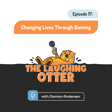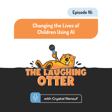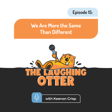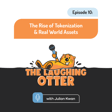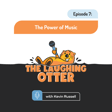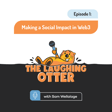Become a Creator today!Start creating today - Share your story with the world!
Start for free
00:00:00
00:00:01

Building a Positive Future with Shwetha Shankar and Odri Fernandes
Transcript
Introduction and Guest Welcome
00:00:07
Speaker
Hello, everyone, and welcome to the Laughing Otter, where we are making the world a happier place one person at a time. I'm your host, Jeff Bogenberger. And today on the show, we are lucky to have friends and entrepreneurs, Shweta Shankar and Audrey Fernandez, who have a long career as business women and investors and making a positive change in the world. Welcome to the show. Thank you, Joe. Thank you. That was amazing. So good to have you.
00:00:36
Speaker
Yeah, well, it's great to have you on the show. And we met a few weeks ago and started talking about where the world's heading and all of the great work that you guys are doing.
Global Women's Peace Network
00:00:50
Speaker
And what really sparked my interest was I want to know more about the Global World Peace Network that you two are involved in. Maybe you can tell the listeners a bit about that.
00:01:03
Speaker
Yeah, so we've been involved with the Global Women's Peace Network for the past year now, and it's just been fantastic. I think looking at all of the work that all of these incredible women are putting in so that there is a lot of peace around within their families, but larger, wider communities. And it's just amazing to see how we go from strength to strength when we can all support each other and not pull each other down. It's just beautiful.
00:01:34
Speaker
So what are some of the kind of activities that you're doing? So what we currently do is we were part of the Women's Peace Federation where we actually had a congregation, we connected, we had mentors and mentees who were really keen to learn more around leadership and powerful women in leadership space and walk them through for the whole entire year. We are onto our second year now
00:02:04
Speaker
doing similar things and also running workshops and really looking at what they value in terms of leadership and how we can keep ourselves, I think, inspired on a daily basis from basic and foundational things like learning about habits and rituals that we can inculcate all the way up to, how we can
00:02:27
Speaker
help the world to come together and, you know, to enjoy some peaceful moments with each other. We actually had Anne who is one of the United Federations for Peace. She's gone off to Fiji and just told us that she's back today. And she was telling us about the incredible work that some of these women are doing in Fiji, across the world in Korea, in the Philippines.
00:02:54
Speaker
in India, in Pakistan, there's like, it's unbelievable when we hear about it. So can you give me some real world examples of some of those incredible things that they're doing?
Cultural and Generational Impacts on Family Values
00:03:10
Speaker
Yeah, so we had Mrs. Moon come in all the way from Korea and she was telling us about how there has been a gap, a generational gap that they're currently dealing with back there.
00:03:24
Speaker
where people earlier, the kids would just continue to be with their families, and they would continue to live there. And now there's a lot of what they're calling as Westernization, and how they're trying to move out of the nest is what she was just calling Mrs. Moon, and how that's impacting them in a way that they're not able to help their, what do you call, their grandparents, their parents, and
00:03:54
Speaker
She was just telling us how we need to have certain values that we can continue to have. So they can kind of, I think it was more around family values that they wanted to inculcate and instill with your kids and then want that to grow. So that was values-based program there. In Australia, there's a lot of programs that I run based on mentoring,
00:04:21
Speaker
women leaders, emerging women leaders. So we were a part of that initiative where there are a group of women who are
00:04:31
Speaker
you know, wanting to learn leadership, wanting to step up, but do not have the resources or do not have the right channels to do it. So we had a set of mentors and mentees paired up to help them to succeed. That was the part we were a part of last year. This year, we are part of the similar program as well as there are workshops being run
00:04:52
Speaker
every single fortnight for the women to know more about leadership and come together every fortnight and share their views on various things like beliefs, values, culture and stuff like that. So that's been done here in nations like Japan or India and other countries there is different level of stuff obviously done. So as Shweta was sharing about the different values gap and
00:05:20
Speaker
beliefs gap and stuff like that. I think I can intuitively make the connection, but maybe for just more clarification, how are you connecting the dots of these values to the idea of improving global peace and harmony on the earth?
00:05:48
Speaker
values and global peace. I love that you asking that question. That's really, really making me think. So what is, I guess the predominantly the gap is the culture where it was strongly dominated by men in some nations.
00:06:13
Speaker
and women did not have the right to so many basic rights. Also, the culture
00:06:24
Speaker
obviously is driven by the values and the values that we have brought even in this generation in 2022 and that is just not limited. So we have come from India and we still in India, when we go back, there is a culture of how a woman is treated, how a man is treated. And as a result of those tribal
00:06:49
Speaker
upbringing, how women show up in the world today with those values of staying in an unresourceful relationship, not demanding their rights, not asking for basic respect or staying in the place where she's not respected. And this is the level of work which is based on values, really recognizing where was the tribal influence.
00:07:17
Speaker
why it is important to now break out of those chains that were holding you back and really stand for yourself and lead your way towards a better tomorrow. Yeah, I love it. And even just celebrating women's rights as is and looking at how we can bridge the gaps between different countries and how their belief systems are and what we can inculcate and what we can learn from each other. Right. So when you refer to the global
00:07:47
Speaker
world peace network. The peace is more around at the individual level rather than typically people talk peace. They talk about ending war and violence and global conflict. But your focus is more on the peace at an individual level, is that correct?
Transforming Mindsets for Global Peace
00:08:13
Speaker
Yes, so that's transforming their minds, their hearts, their souls at an individual level. However, what they are doing is they're also working this way. So one of the incidences that was shared with us during the Federation meeting was they had gone down to South Korea, obviously, where it was something that was frowned upon, looked down upon. Everyone was literally scared because they were all in a bus.
00:08:39
Speaker
And it so happened that there was a riot that broke out. One of them was actually shot. And, you know, there was a lot of chaos and commotion. However, that didn't deter them. They continued to do that work and, you know, bridge the gap between the North and the South and, you know, the rest of the world, basically. So I think what they were trying to do was tell us that if we inculcate
00:09:02
Speaker
this leadership and the spirit of that within women in general, individually, then we can change the world one person at a time. Right. Do you think it's limited to just women or do you think it's important that all of both men and women start incorporating some of these values?
00:09:24
Speaker
Absolutely no limitation. There is no gender bias whatsoever. However, we were connected with them and they just asked us to be part of the organization. However, our view is never limited. Even the people, the clients that we work with, they're all men, women, everyone.
00:09:43
Speaker
They all need to be part of it. That's how we can have a global change for sure. However, we do realize that women are a lot more, what do you call it, still under the bushes, if you might say. And there is a lot of work that we can do to bring out the self-esteem, confidence levels and just make them feel a lot better, emotionally stable.
00:10:08
Speaker
Right, so where do you see the easy wins are? Where is the low-hanging fruit that can be implemented quite easily and makes a relatively large social impact? Are you asking country-wise? Sorry, just globally or nationally,
00:10:36
Speaker
at the local level, it doesn't matter. Where do you see the biggest opportunity in the near term? We definitely see that the part that we've taken and the part that
00:10:52
Speaker
The Global Women's Space Network here in Australia has chosen us to work with women who want to be driven. So then they're the first, they're probably the people who we can easily, so it's awareness first. And once we create that awareness and when they're able to actually work on it and action it, that's where we know that we can start making change because as we all know, any kind of change is challenging
00:11:22
Speaker
And so we're looking at how we can alter people's mindsets and change on a global scale. And that's not going to be easy. So definitely doing our best there. Is that what your question was, Jim? Are there any actionable things that each and every one of us could be doing today that would be a part of that change?
00:11:51
Speaker
I guess the actionable thing that most of us could start immediately doing, most of us who have access to all the resources is starting to become aware of what peace and love, living with peace and love means, right? When you go through the struggle journey, when the way we are brought up, the influence of what's happening at that time of the time
00:12:19
Speaker
in our lives, for instance, now there are people in Russia or Ukraine, they're dealing with the war and other stuff as opposed to countries like Australia who are dealing with different levels of problems. So the generation that is brought has different thinking and different mechanism to cope with whatever is happening. And awareness, personal development is the best way to really recognize
00:12:48
Speaker
what we need to be achieving in this world, where is the direction we need to be taking in order to achieve world peace. And these kinds of major tragedies do not happen. Wars and the other stuff like what's happening in Iran right now with the women having to wear, not having the rights to clothing, then the Taliban and all of these things won't happen. If every person starts becoming more aware and more
00:13:19
Speaker
peace driven and that is the global mission of the peace network. But again, when it comes to country level, it's very different because our Australia is facing different level of problems as opposed to India. So the mission of the organization in different countries and what they're doing is very different. And it's amazing to participate at the level that you're in and make the difference start from there.
00:13:48
Speaker
Yeah, they emphasize a lot on, you know, peace building on how we can all collaborate together and come together to really have some powerful leadership skills for this 21st century. And I feel like it's very, it's beautiful to see how they lead each other and into that mentorship and having them finish program and come out at the end of, you know, the whole year.
00:14:16
Speaker
and how they feel a lot different, comparatively. I'm talking about at an individual level. And I just love to see that transformative changes. And I think that's what drives us. That sounds fantastic. OK, I'm going to ask each one of you this question. And I'd like to hear your answers. If you were queen of the world, what would be the one thing
00:14:46
Speaker
that you would immediately implement? I think I'm already the queen of the world. So that's a very bad question. Fair enough. Fair enough. Well, if you didn't have just symbolic power and you actually had superpowers and you could make one global change, what would it be?
00:15:18
Speaker
one global change they and I had all the powers in the world for people to recognize their true true power of love and that comes from education and recognizing
00:15:37
Speaker
I mean, I have myself been through the personal development journey and developing awareness, self-awareness was the major key in my life and changed everything for me. So if I was the queen and I had some magical powers, I would make everybody self-aware. All these people in Taliban, in Ukraine, in Russia become more aware of what is more important, the spirituality, the inner peace and the joy and the love.
00:16:07
Speaker
That's, that's, that's fantastic. What's your thoughts? Well, it looks like Audrey's creating a beautiful world. Now we need to look at nature and everything else. So global change. I was the queen in my world. I think if we're going to have global peace, it's got to start with you two.
00:16:37
Speaker
Lots of I was thinking more systemic changes. I'm talking about environment and global changes. So definitely we were just talking about it this morning, actually, that during covid, even though obviously lives were affected and impacted, mental health was a shocker. There has been a lot of different things that we had to deal with as human beings with change and coping with it.
00:17:03
Speaker
However, we did find a lot of drastic improvements in our natural environment. And I think that's something that we need to really focus on at a global pace, that is, and how we can heal the world quite literally. Yeah, no, I agree with all of that. And yeah, COVID definitely did take a punch.
00:17:33
Speaker
But hopefully, Ozone is healing. Yeah, that's true. And there were civil linings. And I like to think the biggest silver lining of my life was it gave me the reason to start the Laughing Otter and go on this mission of improving mental health and the lives of children around the world. So yeah, COVID had some good things. If I was the king of the world,
00:18:04
Speaker
It's a simple thing for me that I would, it's, I don't see it happening in the near future, but in the medium fridge, I think it, I think there's a really good chance is just the elimination of flags and borders. Oh, you know what? I love that. I read a quote somewhere, if you want to end wars, kill patriotism. Yeah, that's exactly right.
Imagining a World Without Borders
00:18:28
Speaker
That, um,
00:18:30
Speaker
You can link every war, including the one in the UK right now, to a single individual with archaic beliefs that wants to get their name in the history books of their country. And if you eliminate those borders, because so many other things fall into places as well then.
00:18:56
Speaker
They, it makes it easier to, easier to distribute food and clean water, um, and affordable energy. And also allows you to have a more global strategic approach to, uh, global warming. Um, you want to, you want to stamp out soft fossil fuels? Well, we, we, uh, the three of us, we all live in Australia, well, build
00:19:23
Speaker
build 400 nuclear reactors outside of about four or 500 miles outside of Coober Petey where nobody lives and there's climate change solved. You know, like all these things, if we actually work together as humans rather than self-interested countries, it just seems ridiculous to me
00:19:52
Speaker
that I grew up in Northern Ontario, Canada, where we have lakes that we don't like. We have lakes that we don't even name because there's so many lakes and rivers and all this clean water and and yet just below the border in the U.S., the western states, southwestern states are having the greatest drought they've had in years. Well, the only reason that needs to that that happens
00:20:22
Speaker
is because of nationalistic interests rather than in the interest of humanity. So that's what I would do if I was, that would be the first thing that I would do. Wow, love that. I think that they can really make some big impact because you will kill the borders, I will create awareness and Shweta will change the environment.
00:20:49
Speaker
Sounds like a pretty powerful team. I know, right? We say that a bit tongue in cheek and joking but change has always started at the individual level and then a few more people jump in that are just crazy enough to follow along and then
00:21:14
Speaker
then it becomes a group and then it becomes a movement. And that's never been different for the entire, any sort of political, social, economic change has always come bottom up. It's never come top down, even though the politicians eventually take credit for it. It's not the way it works. And just in recent times,
00:21:43
Speaker
one 16-year-old girl out of Sweden has done more for climate change than NGOs and government organizations have done for years. Wow, that's amazing. She is pretty phenomenal. Yeah, it just shows that if you have the courage and the voice, and we can look, there's people like Martin Luther King, Nelson Mandela,
00:22:16
Speaker
Mahatma Gandhi, like all of these people, they were individuals and they caused movements. And you know what? I like to think that that's what we're doing as well. That's what the Laughing Otter is about. I have this vision. I want the Laughing Otter to do what for mental health and for children around the world, what Greta Thunberg did for climate change. That's my goal.
00:22:42
Speaker
Wow. Love that. Absolutely love that. That's an amazing book. Take immediate action and, you know, challenge the world leaders. That's literally what Greta did. Yeah. And she had the courage to do so. And we all need to do that. And it doesn't have to be to the magnitude of what she did. But just at the individual level,
00:23:10
Speaker
in your workplace, if somebody's being bullied, step up, say something. If you see something. The small way as well makes a huge impact. Yeah, it does for sure. And if somebody makes a racist comment at work, point it out. You don't have to be militant about it. You don't have to be mean about it, but just say, that's not on.
00:23:35
Speaker
That's not phenomenal. Like when we say do work with our clients as well, like it's many times it's just some problem in the business, but the ripple effect is in the personal life and in the personal life of their parents or even their siblings and their kids. And it just flows and it's just phenomenal. Yeah. And it's like, it seems like a bit of a stretch here, but
00:24:04
Speaker
Coming from North America and moving to Australia, Australians are incredibly, in a good way, passive drivers. They're very courteous drivers, and as a result, you never see any road rage, you never see accidents, and people arrive at work in a reasonably good mood, where when I was working in Toronto, drivers are incredibly aggressive,
00:24:34
Speaker
people cutting each other off, there's swearing and yelling out the window all the time. And then people show up at work and now they've just gone through an hour of commuting or an hour or two of commuting and they're just, they're just wound up angry. Yeah. Um, but it's, it's those kinds of little actions that like you said, um,
00:24:58
Speaker
they multiply. Yeah, absolutely. It has a little small incident sometimes can piss someone off and they can ruin the entire day. And all the other people's mood as a result, but a little good action can do the exact vice versa, you know, like the exact reverse, like it can make someone someone's day and everybody else's day in the team and then their kids and their partners and anybody else.
00:25:26
Speaker
It is such a self-fulfilling prophecy. Yeah. That's why we love working with women. Especially women is so powerful, Jeff, is because women play such an important role in the society. They bring up the kids. They instill the values onto the kids. So pretty much the next generation is the values of the next generation are instilled predominantly from the mother.
00:25:56
Speaker
I mean, I don't, you know, I'm not, she's not demeaning any part of the men. Although I do, like I know, cause I have a young son and all of my colleagues are like, all my friends have had children over the last kind of seven, eight years.
Evolution of Parenting Roles
00:26:16
Speaker
I think, and, and it's, it's really nice to see that in
00:26:23
Speaker
A lot of countries, Australia, Canada, US, you're seeing that men and fathers are taking a much greater active role in the parenting. I don't know any father that doesn't have at least an equal amount of time spent with their children. And that's a generation thing that's happened over the last kind of 30 years.
00:26:52
Speaker
It's real positive. And men are just like, I don't want to ignore my son. And all my friends are the same.
00:27:02
Speaker
Definitely it has changed over the period and it's beautiful. You hear the change and it's beautiful. And what is important is that the women is as much responsible for the man's role and the kid's role as well as the man is responsible. And it's about collectively coming up with what we want for the next generation, right? And there was a time when there wasn't such a collaborative approach towards it.
00:27:32
Speaker
Oh, for sure. And it still exists in the majority of countries in the world. I've traveled enough. I see that. It's still in the majority of countries in the world that there's still that delineation. But the opposite, I think, is starting to happen very quickly. Typically, it's in countries that are
00:28:01
Speaker
are multicultural, where there's lots of different cultural influences and countries that tend to be more progressive in
00:28:14
Speaker
and liberal in their views. With the level of issues and problems in the country, like third world countries, they are more obviously at the moment there is more sort of the food safety shelter that's their dominant problems. But if we look at countries like Australia, US, we can go on to the mindset, mental health, we can focus on it because we have the resources, we have the support from the government,
00:28:42
Speaker
you know all the other things taken care of and that the contrast like if you go to India it's not true like we have to people still have to worry about their medical bills they if you know they have to save enough for their future they have to they still worry about their day-to-day income and stuff like that so mental health is very far fetched for them.
00:29:05
Speaker
And then comes the role of women. It's like, what are you talking about? Let's focus on getting the food, safety and shelter first, and then we'll talk about it. Yeah, for sure. And it just it boggles my mind that after 5000 years of civilization across this planet, there are still people on this earth that have to worry about those basic needs when we have
00:29:33
Speaker
so much abundance, so much technology that really, if people were willing and we started acting like the human race, you could pretty much stamp out all of it within about 10, 15 years. It doesn't take long to
00:30:02
Speaker
to mobilize organizations if everybody's playing along.
Profit for Purpose Movement
00:30:10
Speaker
And also this is a great thing that's happening is this whole concept of profit for purpose. So corporations are starting to figure out that you can make money by doing good
00:30:31
Speaker
Which is fine. Who cares what the motivator is if the outcome is really positive for millions and millions of people. And so change is happening. I always say change happens despite the government, not because of it. The people in charge are of no value. They're just there. So what ends up happening is
00:31:00
Speaker
individuals, and then when individuals cause enough noise, the corporations start figuring out that they can make money from making the change, then money gets thrown at it and investment happens. Two perfect examples of that are climate change.
00:31:26
Speaker
gas companies, oil and gas companies, electric co-companies, coal companies, all these people, they're not investing heavily on renewable resources out of the goodness of their heart. They see it as potentially profitable. And the same thing happened with recycling.
00:31:51
Speaker
Nobody recycled and there were no recycling plants until somebody figured out, well, hold on a sec. If we start recycling, we can make money out of it. And that's fine. That's great. I'm enough of a business person, an entrepreneur that I believe that people should be rewarded for the change they make.
00:32:20
Speaker
Yeah, it's fantastic that now this concept of profit for purpose and B Corp organizations are really starting to take take flight, which is yeah, it's great. Yeah, it is wonderful. It is wonderful. And you know how they say the change is inevitable progress is not and it comes down to the choice of are we really progressing with the change or are we going backwards with the change? Right.
00:32:49
Speaker
Yeah, and that's absolutely, we get caught out sometimes, but I have really all the evidence points towards it. Every decade we're significantly further advanced as a human race than we were 10 years ago, despite what the media and politicians want us to believe.
00:33:19
Speaker
And I think as my generation starts to get into leadership positions and the next generation coming up, we grew up believing everyone was equal and protecting the environment and everyone should have a right to a fair life.
00:33:47
Speaker
I think one of the big reasons why Russia right now is having problems with their military and as they recruit people is that people under the age of probably 40, 50, for the most part, they don't believe in this nationalistic patriotism anymore. And this idea that I'm going to give my life for a leader,
00:34:15
Speaker
That's an archaic way of thinking. And rightfully so, like, what are you actually fighting for? And it'd be incredibly difficult, I think, to convince a 20-something in Russia who two years ago was playing world award craft with his pals in the Ukraine to all of a sudden say, okay, well, actually now here's your gun.
00:34:44
Speaker
go start killing those people. It's tough now, I think. And rightfully so. And hopefully this is the last generation of leaders who think like that. Hopefully, fingers crossed. Yeah. So what's next on the agenda for you guys and what you're doing and things that you're working on and projects you're involved in?
Empowering Women in Leadership
00:35:10
Speaker
So we work with women in leadership in personal development space and that's phenomenal. It gives them so much opportunity to really learn about themselves, learn about
00:35:27
Speaker
what's holding them back and how they can really propel forward by getting rid of the limiting beliefs and what is holding them back. And we also work with businesses in the space of helping them with their structure and sales predominantly. And
00:35:47
Speaker
helping their team to scale their numbers. So it's beautiful combination for us as well because it's working from the personal development space with a set of people as well as helping those people who have already taken the leap and really
00:36:06
Speaker
got on to the entrepreneurial journey to then go further and not get stuck in the business but really start working on the business. So yeah, looking at expanding more and also we have some travels planned for India so there's a lot going on. Yes. Yeah, that sounds wonderful and it's
00:36:34
Speaker
I don't, being around this space now for a while of the mental health and also a 20 plus year career, it is amazing how much negative impact or positive impact a person's job has. So the more that people can create that culture of an enjoyable place to work,
00:37:04
Speaker
makes such a big difference on all aspects of people's lives. Because it is such a defining part of our lives. It shouldn't be as much as it is, but it is. And you spend a lot of time at work. And most people, I can't even remember the last time I worked was somebody that didn't take pride and ownership in what they do. So if that's a negative environment, it really hurts.
00:37:34
Speaker
Yes, yes, correct. Taking responsibility and really creating that culture and environment around you is your responsibility. Yep. Well, thanks a lot for being on the show. I think we solved all the world's problem. We just need people to implement them. But where can people find you guys if they have some questions or want to reach out or would like to learn more about all the great work you're doing?
00:38:04
Speaker
cvcoaching.com.au as well as find us on Facebook and Instagram and LinkedIn and TikTok and everywhere in the world. So do connect us with Audrey Fernandez and Shweta Shankar on Facebook as well as LinkedIn and visit our website. We'd love to connect more with you. All right. Well, thanks again, guys, for being on the show. Thank you so much for having us over. Thank you.
00:38:32
Speaker
Yeah, it was fantastic. And to everyone else, remember to visit the laughingauter.com and to find us on Twitter, Discord, Facebook, and Instagram for all the latest news. And cheers. And remember, we all deserve to be having a lot more fun. Absolutely. Thank you, Jeff.



